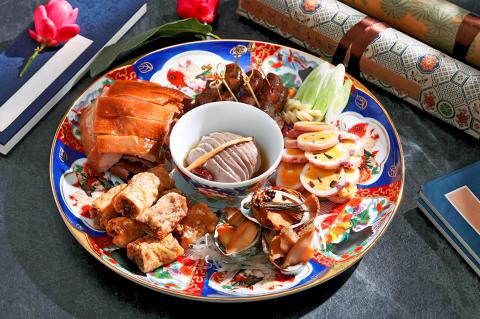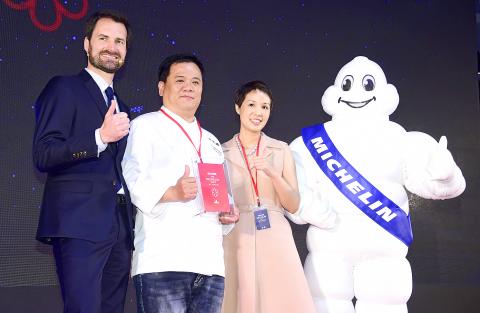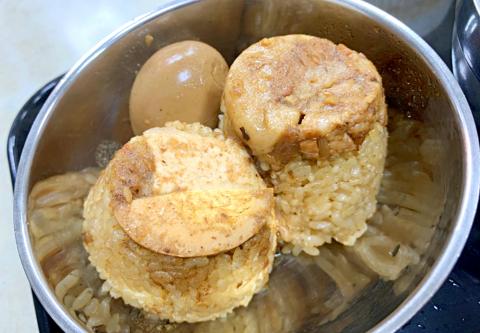The French Michelin Guide yesterday awarded stars to 24 establishments in its second restaurant guide to Taipei.
“Our inspectors were not only impressed by the standard of local Taiwanese cuisine, but also by the global influences being imported by the very talented and innovative local chefs, which together will no doubt entice food lovers from around the world,” said Gwendal Poullennec, International Director of the Michelin Guides.
Establishments like Tairroir (態芮) and Raw, prominent names that each received a star last year for thoughtful modern treatments of Taiwanese ingredients, embody that attitude. Both restaurants rose to earn two stars in this year’s guide.

Photo: Ling Mei-hsueh, Taipei Times
The name Tairroir — a portmanteau of “Taiwan” and “terroir” — is an artist’s statement by chef Kai Ho (何順凱). Speaking after the ceremony yesterday morning, Ho said that his intention went beyond using indigenous ingredients, to give diners an immersive experience in Taiwanese culture and history.
Raw, opened by renowned chef Andre Chiang (江振誠) in 2014, is already one of the city’s most in-demand reservations. Chiang’s decision to shutter his eponymous two-star restaurant in Singapore last year and return to train a new generation of Taiwanese chefs was regarded as a boon for the country’s culinary scene.
Chef Alain Huang (黃以倫) said that Raw, which treats local ingredients with French techniques, had taken the last year to embark on “deeper research” into Taiwanese produce and culture. But the win still came as a surprise.

Photo courtesy of Taiwan Michelin
Also among the new one-star recipients is Mountain and Sea House (山海樓), which serves meticulously-researched banquet-style dishes honoring Taiwan’s culinary heritage. Chef Tsai Jui-lang (蔡瑞郎) acknowledged the hard work of colleagues who scour the island in search of native species of ingredients, allowing his kitchen to revive authentic versions of Taiwanese dishes from early 20th-century recipe archives.
Two young restaurants that opened just last year also received one star each at yesterday’s ceremony — Logy, which Hokkaido-born chef Ryogo Tahara said aspires to bring French and Italian inflections to Asian cuisine; and Impromptu by Paul Lee, which offers casual fine-dining for an international palate.
One new entrant immediately received two stars on its first outing with the Michelin Guide. Sushi Amamoto is a 12-seat sushi bar offering a 20-course chef’s choice menu, with seasonal fish flown in from Kyushu and Tokyo.

Photo: Chou Tsai-wei, Taipei Times
Cantonese restaurant Le Palais (頤宮) at the Palais de Chine Hotel remains Taipei’s only three-star Michelin establishment.
Reactions by recipients ranged from delight to near nonchalance, with many admitting that they could not take the day off to celebrate as they had full houses of reservations to honor.
“The pressure starts tomorrow,” Ho said, acknowleding the high scrutiny and expectations that Michelin honorees receive.
STREET FOOD CAPITAL
Earlier, Michelin also named 58 eateries, including 25 new entrants, in its more affordable Bib Gourmand selection. To qualify for the Bib Gourmand, an eatery must offer a three-course meal not exceeding NT$1,000 (roughly US$32).
Gongguan (公館), Yansan (延三) and Huaxi Street (華西街) night markets made their debut on the list, which already recognizes Shilin (士林), Ningxia (寧夏), Raohe (饒河), Nanjichang (南機場) and Linjiang (臨江) night markets.
Yansan landed a whopping three recommendations on its first appearance, owing to the market’s delectable cabbage rice and pork rib soup, savory tube rice cakes and glutinous rice meat dumplings.
Like other Asian capitals with rich street food cultures, the Bib Gourmand selection lends a sheen of glamor to Taipei natives’ humble favorites like scallion pancake, stinky tofu and guabao (割包) — flat steamed buns stuffed with braised pork — and will be an indispensable guide for globe-trotting foodies.

April 28 to May 4 During the Japanese colonial era, a city’s “first” high school typically served Japanese students, while Taiwanese attended the “second” high school. Only in Taichung was this reversed. That’s because when Taichung First High School opened its doors on May 1, 1915 to serve Taiwanese students who were previously barred from secondary education, it was the only high school in town. Former principal Hideo Azukisawa threatened to quit when the government in 1922 attempted to transfer the “first” designation to a new local high school for Japanese students, leading to this unusual situation. Prior to the Taichung First

When the South Vietnamese capital of Saigon fell to the North Vietnamese forces 50 years ago this week, it prompted a mass exodus of some 2 million people — hundreds of thousands fleeing perilously on small boats across open water to escape the communist regime. Many ultimately settled in Southern California’s Orange County in an area now known as “Little Saigon,” not far from Marine Corps Base Camp Pendleton, where the first refugees were airlifted upon reaching the US. The diaspora now also has significant populations in Virginia, Texas and Washington state, as well as in countries including France and Australia.

On April 17, Chinese Nationalist Party (KMT) Chairman Eric Chu (朱立倫) launched a bold campaign to revive and revitalize the KMT base by calling for an impromptu rally at the Taipei prosecutor’s offices to protest recent arrests of KMT recall campaigners over allegations of forgery and fraud involving signatures of dead voters. The protest had no time to apply for permits and was illegal, but that played into the sense of opposition grievance at alleged weaponization of the judiciary by the Democratic Progressive Party (DPP) to “annihilate” the opposition parties. Blamed for faltering recall campaigns and faced with a KMT chair

Article 2 of the Additional Articles of the Constitution of the Republic of China (中華民國憲法增修條文) stipulates that upon a vote of no confidence in the premier, the president can dissolve the legislature within 10 days. If the legislature is dissolved, a new legislative election must be held within 60 days, and the legislators’ terms will then be reckoned from that election. Two weeks ago Taipei Mayor Chiang Wan-an (蔣萬安) of the Chinese Nationalist Party (KMT) proposed that the legislature hold a vote of no confidence in the premier and dare the president to dissolve the legislature. The legislature is currently controlled